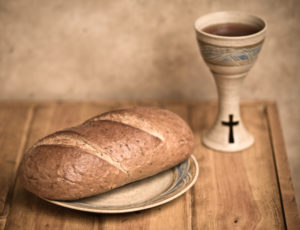Holy Communion (1 Cor. 11:23-29)
There was a boy, four-year-old, when the wine and bread were passed out in the worship service. He was very interested in those. As they came near, he started to get up. But his mother leaned over and told him that he was not old enough to partake in the Communion. Imagine how sad and disappointed he was being denied.
Later, when offering time arrived and the collection plate came by, the boy simply ignored it. His mother again leaned over and tried to pull the quarter out of his hand. But he steadfastly refused and said, “If I can’t eat, I’m not paying.”
For today is World Communion Sunday, I will talk about Communion. By the way, as you know, our church offers Communion on the first Sunday of each month. For reference, there are many other names associated with this special religious practice: Holy Communion, Sacrament of Communion, Bread and Wine (the Elements), Body and Blood of Christ, Lord’s Supper and Eucharist.
Nowadays there are two Sacraments that are observed in the Christian Church: the first is Baptism and the other is Communion. Unlike Baptism that is a one-time event, Communion is a ritual that is meant to be celebrated over and over throughout the life of a Christian. It is a holy and joyful moment as all the members of the church come together as one body, remembering and celebrating what Christ did for us.
As a matter of fact, the Holy Communion is a sacrament that, on that night just before taking the Cross, Jesus Christ himself had offered to his disciples and he commanded them to keep it in the days to come. In observance of this ritual we are remembering Jesus Christ and all that he has done for us in his life, death and resurrection. So obediently and joyfully we observe it over and over as commanded by the Lord:
For I received from the Lord what I also passed on to you: The Lord Jesus, on the night he was betrayed, took bread, and when he had given thanks, he broke it and said, “This is my body, which is for you; do this in remembrance of me.” In the same way, after supper he took the cup, saying, “This cup is the new covenant in my blood; do this, whenever you drink it, in remembrance of me.” For whenever you eat this bread and drink this cup, you proclaim the Lord’s death until he comes. (1 Cor. 11:23-26)
In the Christian Church in general, there are three main views regarding the bread and the wine during the practice of Communion:
First, the elements of Communion, which are the bread and wine, become the actual body and blood of Jesus Christ. It is the main understanding of the Catholic Church about the bread and wine in Communion, and this understanding is frequently called “transubstantiation” in the theological world. When the priest lifts them in thanksgiving, the substances of bread and wine are turned miraculously into the substance of Christ himself. It means that the underlying essence of bread and wine is changed, but they still retain the appearance, taste and texture of these elements.
Second, the bread and wine never change in Communion. However, by faith Jesus Christ is present spiritually in and through the holy elements. It is suggested by Martin Luther, the Reformer, and this theological doctrine is called “consubstantiation.” Jesus Christ makes himself present spiritually (mystically), right alongside the elements of bread and wine.
Third, the bread and wine never change in Communion. However, as symbols they present Christ’s body and blood in the practice of Communion and help the participants to remember his sacrifice for them. It is suggested by most major Protestant Reformers, and it is called “memorialism (or symbolism)” in theological terms. They strongly rejected “the concept of transubstantiation” and claimed that the transformation is symbolic.





